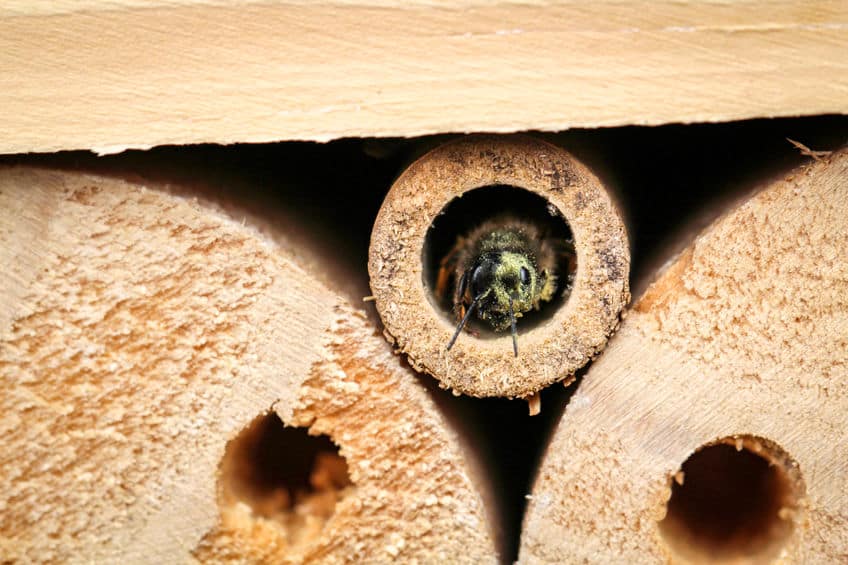The concept of a bee hotel creates a wonderful image; a small space in your backyard providing refuge for solitary bees, allowing them a safe haven in areas where habitat destruction can be a real issue. Most hotels are constructed for the use of mason bees and leafcutter bees but can have many different sizes of holes in chunks of wood or varying sizes of hollow reeds to accommodate different species. In short, bee hotels are a great idea to attract solitary, native pollinators to your backyard. But they have a few issues.
If you look up images about bee hotels, you’ll often see large structures with many different sections for different species. Bees can be territorial and don’t often allow other species near their nests, and having a large hotel can also attract predators such as birds, which can easily wipe out the populations. The other issue is disease; bacteria, fungus, and viruses can quickly travel through the hotel, leaving rot or dead larvae in its wake. As well, consider the types of species in your area. Mason bees usually only travel about 100 metres from the nest, and others may have even smaller radiuses. Combine the two and competition for food can become an issue if there aren’t enough flowers nearby.
That said, don’t be discouraged! There’s an easy solution: instead of building one big hotel to accommodate several species, build a bunch of small hotels that are specific to each type of bee, and spread them around the property. Remember that the more hotels you have, the more flowering plants you’ll need, so don’t go building a ton of hotels if forage in your area is low. Even one small bee hotel built for mason bees will be a great benefit to the local population.
You may notice that your hotel will attract unexpected inhabitants, including solitary wasps. Don’t get rid of them! Solitary wasps are great pollinators and are predators for garden pests such as aphids and weevils.

Best place to put a bee hotel
Hotels can placed just about anywhere. In an orchard or growing area, considering having them on a post or on a tree. A bit of shade will benefit the hotel so as not to cook the larvae in the hot sun, so placing them on the east side of a house or under the shade of an awning will protect the bees. Be wary of where flowers are most plentiful, and try to keep the hotels close to those areas. You can also spread pollinator blend seed mixes, let some weeds grow, and fill your garden with plants that produce lots of blooms. Early flowering plants such as crocuses and snowdrops offer food for bees that emerge early in the year. As well, don’t put the hotels near busy roads; traffic is a huge killer for insects.
Pesticide usage can be extremely detrimental to bees, so if you know of any neighbours who spray, keep the hotels as far from them as possible. This can be difficult on small properties, but you may also be able to encourage said neighbours from not spraying, using friendlier alternatives such as vinegar, or asking them to delay spraying until after the bees’ lifecycles are over. Mason bees, for instance, only live around 6 weeks.
What to look out for when buying a bee hotel
There are many options when searching online for bee hotels, but not all are going to be suitable homes. Natural materials are best, since hollow reeds and holes in wood are what solitary bees are drawn to when seeking a place to live. Avoid hotels constructed from plastic or heavily treated wood; both can contain chemicals that could prove fatal to the bees. Even BPA-free plastics are not ideal, since the material is not porous and therefore won’t soak up excess moisture in the nests.
A slanted roof that overhangs the reeds or holes provides shade and prevents water from entering the nests, and holes or reeds that are all roughly the same size will allow a single bee species lots of room to lay eggs. Some hotels have a net or mesh in front of them to prevent birds from accessing the tasty larvae within; just make sure the mesh is large enough for the bees to easily pass through.
When you’re on the hunt, look for local artisans who make hotels. They likely have experience with the local bee species, and will know what sizes the holes or reeds should be. It also ensures that the materials are locally sourced, and not likely to contain harmful chemicals.
